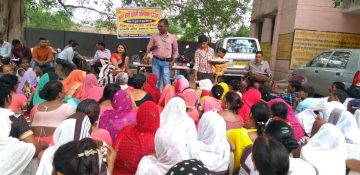Stop the Transmission of Leprosy! (PEP++) Project expands to Nepal and Bangladesh
Due to the impact of COVID-19 and previous delays in study authorisations, the Stop the Transmission of Leprosy! (PEP++) Project is expanded to Nepal and Bangladesh since the fourth quarter of 2021.

The main motivation behind this measure is to complete the enrolment of the close contacts of persons affected by leprosy into the enhanced preventive treatment regimen trial as quickly as possible to determine its effectiveness at preventing the disease. By working in additional study areas, the teams will be able to collect the data necessary from a sufficient number of participants (around 800,000) to answer this key research question.
After reviewing all the research criteria, it was determined that specific districts in Nepal and Bangladesh offer excellent epidemiological and operational conditions for the project. ILEP partner, The Leprosy Mission International (TLMI), has put up additional funding to cover the costs of inclusion of Bangladesh. This partnership is critical not only to finish the PEP++ study over the next three years but also to develop an alliance to promote the replication of the new regimen in other countries in the future.
Expediting the process
In addition to this important study expansion, some measures are taken to expedite the achievement of project objectives. These measures, that adhere to the scientific criteria, include: a) focusing on the preventive treatment regimen trial before beginning community-wide drug administration in the hotspots of highest transmission in the study areas; and b) leaving the follow-up of these additional community contacts until a follow-up study in the future. By adopting these approaches, it should be possible to reduce the duration of the project by about one year, thus providing considerable savings.
About the project
With the project ‘Stop the transmission of leprosy!‘, NLR seeks to interrupt the transmission of leprosy in two districts in five countries that rank among the countries with the highest global leprosy burden: India, Brazil, Indonesia, Nepal and Bangladesh. In this study a new, more powerful preventive chemotherapy regimen for leprosy named PEP++ is used and combined with innovative approaches to intensify case detection of leprosy. The project targets close contacts (household members, family members, neighbours and social contacts) of new leprosy patients, because they have the highest risk of developing the disease. The project is funded by the Dutch Postcode Lottery through its Dream Fund.